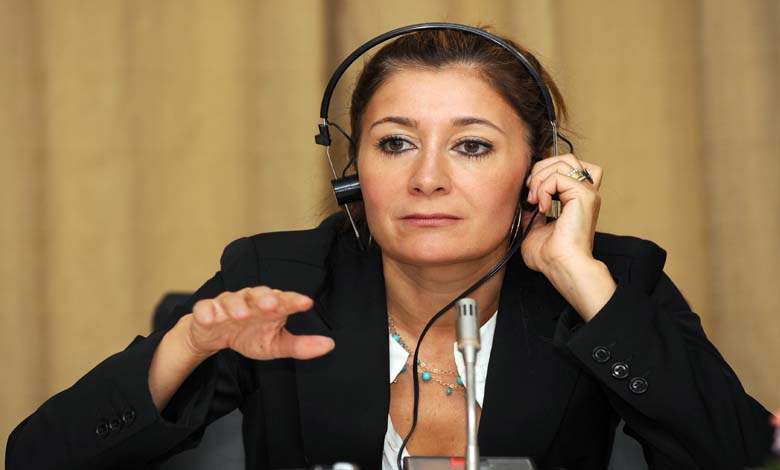Sarah Leah Whitson, a human rights activist supporting extremist elements
Supports the Houthis and criticizes American and British airstrikes that resulted in the death of 12 Houthi soldiers.

Sarah Leah Whitson, the executive director of the Arab World Democracy and Human Rights Organization (DAWN), is an American human rights journalist of Palestinian descent who was a frequent guest on Al Jazeera and Brotherhood-affiliated channels.
Whitson worked from 2004 to 2020 as the executive director of the Middle East and North Africa division at Human Rights Watch, overseeing work in 19 countries and working with staff in 10 countries.
Whitson led dozens of investigative missions throughout the Arab region, focusing on issues related to armed conflicts and accountability. She previously worked in New York for Goldman Sachs and partners, as well as Cleary Gottlieb Steen & Hamilton.
Background and Education
Born to an American father and an Armenian mother from the Armenian Quarter in the Old City of Jerusalem, she studied at the Armenian school in Los Angeles, California, and graduated from the University of Berkeley. She then spent several years in Egypt, earning a law degree from Harvard University in Boston.
Support for Terrorism
Both Britain and the United States previously conducted a joint strike against a Houthi anti-ship missile, while dozens of targets in Yemen were bombed, resulting in the death of 12 Houthi soldiers. This was in response to repeated Houthi attacks on ships in the Red Sea, disrupting global trade.
Executive Director of the Arab World Democracy and Human Rights Organization Sarah Leah Whitson made statements supporting suspicious activities, particularly supporting terrorism and extremist elements. Her tweets supporting the Houthis and criticizing American and British airstrikes resulting in the death of 12 Houthi soldiers were noted.
Support for Brotherhood Issues and Supported Causes by Organizations.
Criticism of the UAE, Saudi Arabia, and Bahrain
Saudi Arabia and the Khashoggi Case
In an interview with CNN, Sarah Leah Whitson made derogatory remarks about Saudi Arabia, especially in the case of Jamal Khashoggi. She added that granting immunity to the Saudi crown prince in the case brought against him by Khadijah Genghis, Khashoggi’s fiancée, indicates a “green light to continue what he has done.” Sarah Leah Whitson was the director of the organization based in Washington, that Khashoggi funded.
Bahrain
Human Rights Watch mentioned in a report by Sarah Leah Whitson that “Bahrain violates legal procedures and claims of mistreatment, forced confessions, and confessions. The regime had previously threatened his wife, young son, and other relatives with arrest and torture.
She stated that Bahrain continued its deterioration in human rights during 2017, with the government harassing, persecuting, intimidating, imprisoning, and prosecuting human rights defenders and their relatives on charges that should never have been brought against them.
Sarah Leah Whitson said that “Bahrain’s tolerance for dissent is almost non-existent, and it erases any progress made after promising reforms in the wake of the disturbances in 2011.”
UAE
In her criticism of the United Arab Emirates, she said: “The UAE’s repressive laws and shaky judicial system belie the government’s efforts to present the country as a moderate and progressive state. The UAE may appear as a safe place for shopping, conducting business deals, or spending a winter vacation, but it is gradually becoming a highly dangerous place for expressing political views.”
This led to concerns among Emirati media forums about the entry of social media sites into the line of spreading rumors, and what they said was “exploitation to harm the security and safety of the state, through internationally funded networks,” citing the need to activate the “cybercrime law” Reputation, with the aim of countering rumors that may harm the state’s image and prosecuting those who repeat these rumors legally, according to them.
Sarah Leah Whitson and Human Rights Watch
Human Rights Watch, whose registration was amended in New York in the early 1990s to a charity receiving donations for charitable work rather than human rights, was aimed at facilitating fundraising from Arab countries, where Sarah Leah Whitson, director of the organization’s Middle East, received donations amounting to $15 million.
When one of the Gulf states allowed her to visit to try to raise donations for the organization on the pretext of criticizing Israel, before visiting Israel later, to do the opposite, i.e., to collect donations from Israelis on the pretext of criticizing Arabs and Palestinians.
In addition to her visit to Libya in 2009, where she met with Colonel Muammar Gaddafi and his son Saif al-Islam, and praised the democratic experience in Libya, prompting the NGO Observatory to accuse her of receiving bribes from the late Muammar Gaddafi and allocating her $100 million from the advisory board member “American Jewish billionaire George Soros,” who funded the idea of dividing the Middle East.












